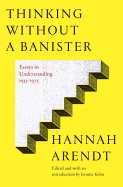
Hannah Arendt was a key 20th-century Jewish German-American political theorist who was committed to thinking outside traditional moral, political, religious or philosophical structures. The first volume of Essays in Understanding, 1930-54, was published in 2005. This second volume covers the last 20 years of her life, the period after she became a U.S. citizen and wrote most of her major books. It collects more than 40 of her interviews, essays, reviews, public talks and editorials for the first time.
Arendt's importance and the arguments raised by her work are well-established, and editor Jerome Kohn provides a good overview and context in his introduction. Many of these short works deal with her recurring interests in totalitarianism, political freedom and revolution. Others deal with the assassination of President Kennedy, violence in U.S. society, Karl Marx, Heidegger, the novels of Nathalie Sarraute, separation of church and state, and her memories of her friend the poet W.H. Auden. In a long essay on the Hungarian Revolution, she lays out her ideas about a council form of government, "the only alternative for a democratic government in the modern age." She bases them on revolutionary councils that have "emerged with a historically unparalleled regularity whenever the people have been permitted for a few days, or a few weeks, or months, to follow their own political devices without being spoon-fed by a party or steered by a government." A few of these pieces are dated now, but in all cases her thinking is as fresh and challenging as ever. This collection will interest those who are already familiar with her, and could be a good introduction for new readers as well. --Sara Catterall

